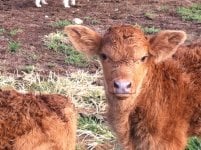I thought I had the dilutor deal figured out years ago, until it became apparent that a dilutor gene could be carried silently (not expressed). Such as the the case mentioned by lean beef where a dark red parent bred black can have a grey calf.
In addition, we had a curve ball to the whole homozygous black situation occur about 7 or 8 years ago. ASA announced it in one of their weekly news letters, but most have probably forgotten by now. This is a little off subject, but still very interesting. Sold a Simmental bull to California sired by Preferred Beef that was tested Homozygous Black. When calves started arriving the next spring, over 25% of them were red, which, of course, is impossible! After first confirming parentage on 2 red calves, we then went back & tested the bull again. He came back homo-black again. wow. Tested his donor dam, who was thought to be heterozygous black, as she had numerous red calves. Surprisingly, her test came back homo-black. Again, nearly impossible. I don't know if any of you remember the old Simmental bull Red Charlie, but he was the sire of the donor. He was dark cherry red with black pigment on the eyes, nose, tail, etc. If I recall correctly, he was already deceased at the time. With many experts analyzing this whole process, it was ultimately determined that a wild allele, or a mutation of some type, was causing the black gene to mutate to the red color. Really, really stange; a one in a million situation. The thought is that if we could've went back and checked Red Charlie, though he was red, that he would've tested with at least one black gene. Also, it was our best guess that the red calves in california probably would've tested with a black gene. Crazy crazy deal.
Just when you think you have it figured out, mother nature throws a curveball.

